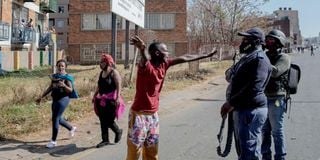South Africa counts the cost of unrest

A protester gestures as he speaks to South African police officers in order to ask them to not shoot in Jeppestown district, Johannesburg, on July 11, 2021.
Gauteng and KwaZulu-Natal (KZN) provinces started returning to normalcy on Friday after days of violent protests but there are fears of shortages of food and fuel.
South Africa has also started counting the cost of arson and the looting frenzy with initial projections pointing to devastating amounts of money.
Empty shelves are being witnessed in some supermarkets in Gauteng and KZN as deliveries and the production of goods were disrupted.
Also, bread queues could be seen as the two most populous provinces are starting to feel the pinch caused by the disturbances.
There are also fears of looming fuel shortages as the Shell and BP South African Petroleum Refineries (Sapref) in Durban, the country’s largest crude oil, temporarily shut down on Tuesday due to the chaos.
Some fuel stations turned away motorists while indicating they have not received their deliveries.
Cane fields burnt in KZN, the largest sugar-producing province in South Africa, forcing some sugar mills to shut but minister Ntshavheni poured cold water on fears of food shortages.
But the Acting Minister in Presidency Khumbudzo Ntshavheni has, however, tried to allay fears that food will be
“I need to clarify this allegation that food supplies will run short in 24 hours – it’s not correct. We have been in meetings with industry... food supplies are not going to run short in 24 hours, there are enough supplies to last us until the N2 and N3 are opened to move the goods,” Minister Ntshavheni said.
For a country whose economy is already feeling the bite of lockdown, events of the past week worsened the situation.
The looting and destruction of key economic infrastructure especially at the Port of Durban, which handles 65 percent of South Africa’s container traffic, has placed the country on the economic edge.
PricewaterhouseCoopers (PwC) projects 50,000 jobs are now at risk under the baseline scenario.
“From our perspective, these events essentially placed key areas of the Gauteng and KwaZulu-Natal economies in a virtual level 5 lockdown,” PwC said in its July economic outlook report.
“Our calculations show that national GDP growth could be 0.4 percentage points lower this year due to this week of significant disruption.
“Given the loss in potential economic growth, we estimate up to 50,000 jobs could be at risk under the baseline scenario.”
The retail industry was the worst hit by the violent protests and an estimated R5 billion was lost.
Chaos has engulfed South Africa following the 15-month jailing of ex-President Jacob Zuma for contempt of court.
What started as protests against Zuma’s incarceration have turned into “opportunistic criminality” according to the South African Police Service.
The violent riots started in KZN last Friday, before spreading into Gauteng at the weekend.
The looting mainly took place in townships in what is regarded as the worst unrest since the end of apartheid 27 years ago.
A surge of Covid-19 infections is also expected in the upcoming days as rioters would be seen ravaging shops without masks in a country whose vaccination programme has not yet been much embraced.





